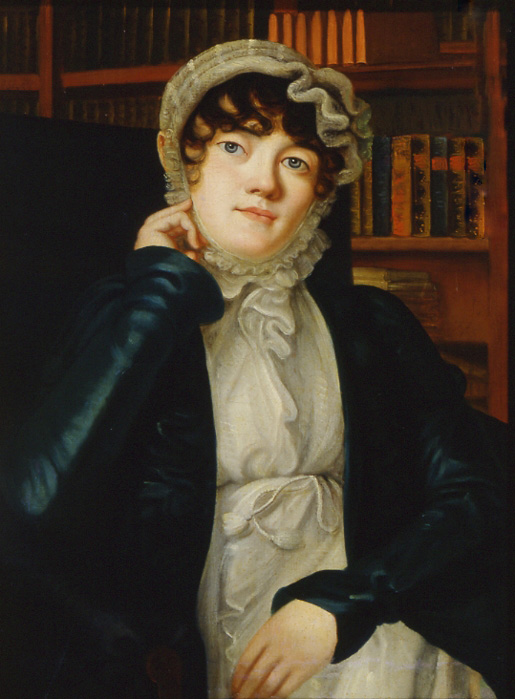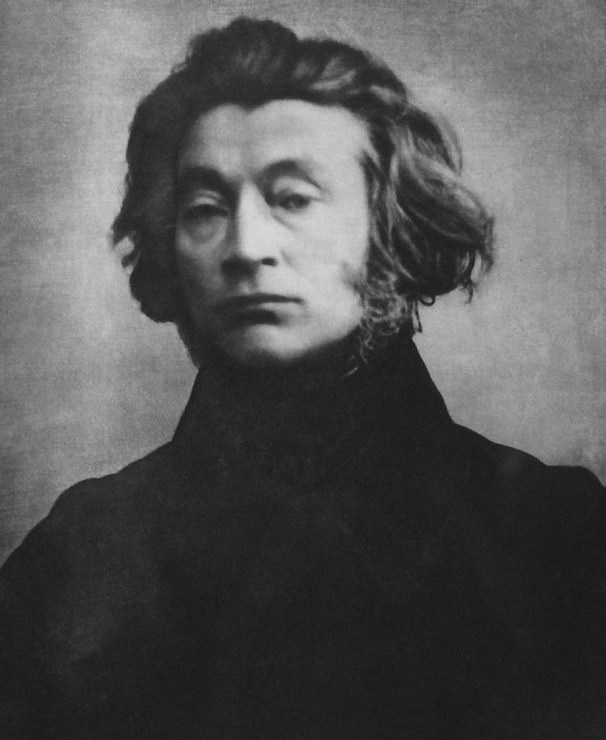Nadezhda Khvoshchinskaya is the second woman writer of Russia’s 19th century who I’ve read, the first being Karolina Pavlova. (I wrote about Pavlova’s novel, A Double Life, here). Where Pavlova produced a flawed but original novel about the life of a young aristocratic girl who falls prey to the schemes of the men and older women surrounding her, using satire and mixing poetry and prose in a way that has more in common with the German novellas of the early 19th century than Russian literature, Khvoshchinskaya is not particularly stylistically original at all. Her stories make use of the 19th century’s staple: drab and workhorse realism.
In spite of her uninspiring prose, what Khvoshchinskaya brings to the table is a commitment to shining a light on the struggles that the average woman in Imperial Russia faced. In her task she is rather more subtle than Pavlova, whose anger often undermines the effectiveness of her arguments, and in many ways she anticipates Chekhov. The difference between them is that Khvoshchinskaya focuses on women’s suffering specifically, at least in “The Boarding School Girl”.

The Boarding School Girl
The first thing to have in mind when reading Khvoshchinskaya is that like the Brontë sisters, she too used a male pseudonym – V Krestovsky. What that meant in practice is probably that there was some pressure on her to self-censor to appear more “manly”. “The Boarding School Girl” begins with what might be such an attempt. The story’s first scene, in spite of its title, is occupied by two young men – Veretitsyn, and Ibraev. They are in a small administrative centre, somewhere deep inside Russia. Veretitsyn has been there for over a year – they are walking in his garden – while Ibraev has just arrived, to take up an important administrative position at the head of some department. Veretitsyn, we soon learn, is almost the opposite. He is watched by the police, a certified “dangerous influence”, and in exile. But they are old friends and want to catch up.
Towards the end of the meeting they notice a girl through the bars of Veretitsyn’s garden fence, walking in her own garden with a book and studying hard. In spite of Veretisyn’s assertion that “I don’t want her to be happy”, he decides to go and speak to her. And thus begins the acquaintance that sets in motion the events of “The Boarding School Girl”.
Our Heroine: Lelenka
Our heroine is Lelenka, a girl of about sixteen. She is introduced to us not by her physical characteristics, but by her mental ones – she has a good memory, and is a hard worker. Her eyes are not beautiful, but “clear and direct”. And indeed, Khvoshchinskaya predominantly uses a kind of anti-description of her, opposing her to typical women and, indirectly, to men’s typical definition of them. Lelenka’s look “was not coquetry: her calm gaze did not challenge, didn’t seek out a conversation; she did not even close her book”. She speaks a little with Veretitsyn through the bars of the garden wall – a prominent symbol for her lack of emancipation, and then she goes home.
They meet again later. We are perhaps expecting a romance to come of this. After all, Veretitsyn, the exiled revolutionary, fits neatly into a class of characters known as “superfluous men” who populated Imperial Russian literature since either Eugene Onegin (Eugene Onegin) or Pechorin (A Hero of Our Time), depending on who you ask. The most recent prominent example for Khvoshchinskaya would probably have been Rudin, in Turgenev’s novel of the same name, published in 1855. Superfluous men are intelligent, but ineffectual. They speak well but they are unable to commit to any of the radical ideas they espouse. As a result they either die bleakly, live bleakly, or are redeemed by a poorly-written angelic woman.
Veretitsyn acts as a kind of alternative teacher for Lelenka to those at school. He reveals to her the artificiality of her life, and puts into her head the idea of freedom by making her aware of how little of it she has: “You are a wonderful, obedient, kind daughter: you are only acting according to your duty” (emphasis mine). She should instead live for herself. Veretitsyn is just playing around – he’s terribly bored, and Lelenka is a pleasant distraction. When he gives her Romeo and Juliet to read the tone of his thoughts is derisive: “well, let her educate herself!” he thinks. It is a “violent joke”.
But for Lelenka herself, his words are not such a joke. She realises that she has indeed never been doing anything for herself. The usual translation of the title of the story, “The Boarding School Girl”, is not perfect because Lelenka does not actually board at school, but goes there every morning, accompanied by a servant from her household. “The School Girl” is probably better. Either way, the emphasis is on education. Lelenka is constantly learning in the story, but not only at school. After speaking with Veretitsyn she realises her education has consisted simply of memorising things, never of thinking for herself.
An Unhappy Family
We see her lack of choice in her domestic life. “Raised in fear”, the children of her family know only the route to their school and back. At home she is told by her mother “sew, sew, or read a book”. But she starts to recognise her parents’ hypocrisy, the way that they are constantly “puffing themselves up” (the Russian word “важничать” comes directly from the word for “importance”) in spite of their lowly position and poverty. Lelenka, however, only recognises her unfreedom – she has little power to remedy it. She flunks her school exams, completely pointlessly, as an act of rebellion. But that’s all she can do. Khvoshchinskaya makes use of passive constructions in Russian to show her lack of agency, for example “All of these clothes were placed upon Lyolya”.
Her parents decide without consulting her that, as she’s now sixteen, she must get married. In addition to parents, social constraints are another layer of restraints placed upon women in the 19th century in Russia. At one point her mother is bartering concerning the price of the dowry for Lelenka – a kind of concrete reduction of Lelenka from human being into an object with a price attached. At another, a friend of her mother’s asks her if she speaks French and asks to listen, even though the friend doesn’t even understand it. Lelenka is told “you just need to submit, submission is what’s needed”, and that “you need to thank god for sending you someone to take care of you”. God is the final tool for keeping Lelenka in her place.
The Revolutionary and his Protégée
Veretitsyn was just having fun with Lelenka. He had no idea that his words could have had an effect on her. But she discovers freedom: “Let them make of me a woman in the kitchen, a worker… but I’ll not be a slave”. When Veretitsyn hears that she has failed her exams he is shocked and changes tack. He now starts defending the system he had earlier criticised. “You understand that people need to live with each other; that’s why we have laws, and rules, and convention”. But it is too late. Lelenka knows that Veretitsyn has “spoiled [her] character”, but she can do nothing but continue down that path. She thinks for herself – “Will I really have children one day? Will I really live just as they do?”
The answer is no. Veretitsyn, giving her Shakespeare, opened her mind to a new way of existence, one dominated by passion and personal interest. The description of reading (in French) is filled with joy – words were now “understandable without the slightest effort, everything just translated itself in her mind, in her heart, not from the words but from some kind of feeling clearer and more rich than words themselves”. Veretitsyn, unable to liberate himself from cynicism, successfully liberates Lelenka from her own circumstances.
In Petersburg
The second-to-last chapter ends with Lelenka being told that she has to marry. She refuses, but we don’t expect her to manage to hold our forever. The final chapter, taking place eight years after the events of the rest of the story, seems at first to confirm this. We are taken to the Hermitage in Saint Petersburg. Khvoshchinskaya gives us a panoramic view of the people here – ladies and serious men. The descriptions focus on tight, restricted clothing. But instead we are taken not to a “lady” but to a “female artist”: it is, of course, Lelenka. There she meets among the visitors Veretitsyn, and she invites him home to chat.
A lot has changed. She is no longer Lelenka (a diminutive, showing her immaturity), but Elena. When Veretitsyn offers to carry her artist’s things she refuses, and when they stand by the banks of the Neva there is no longer a fence separating them. They are now, at last, equals. We learn that after hearing about the marriage Lelenka fled to her aunt’s, in Petersburg, and there she started going to a new educational establishment. The teachers there noticed her talent for painting, and helped her to develop it. She now has complete independence, financially as well as in every other sense – she knows three foreign languages, does translations and paintings. “I am free”.
Veretitsyn has declined where Lelenka has grown: “with the years one gets quieter”. He disagrees with her, calls her and her generation egotists. For him, it is enough that things get slowly better. She has permanently rejected love as a “yoke” and now lives for herself. When the story ends, we hear the “rustle of a pen upon paper” as she works. The sound “rustle” in Russian is normally associated with dresses, but Lelenka is not like those others. With that simple word choice, we see how far she’s come.
Conclusion
“The Boarding School Girl” is at its most interesting in this final chapter. The earlier portions catalogued Lelenka’s unfreedom, but here Khvoshchinskaya is really going against the patriarchal grain by ultimately showing that freedom is not only possible for women, but actually enjoyable. However, I’m not convinced by it. I guess it’s just the stodgy reactionary in me, but Lelenka’s freedom is marked by an unacknowledged loneliness that will only get worse as time goes on. She may be young and free and happy now, but I can’t see it lasting forever.
Freedom is as much a yoke as love is, and I find some merit in Veretitsyn’s view too, that Lelenka’s work is “just another source of opium”. In the end, Khvoshchinskaya herself doesn’t really take a side. Lelenka certainly has grown up – and that this is a good thing nobody can reasonably deny – but the endpoint she thinks she’s reached may only be the first step on a more challenging journey to full maturity. But that continuation of her story, unfortunately, was not written.
A good short article with extra information on the story is here.


